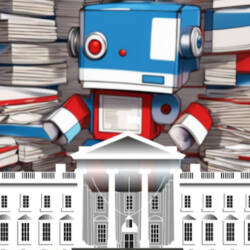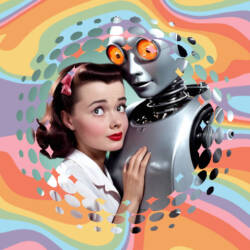Pen Still Mighty? AI-Written Erotica Reviewed by a (Human) Erotica Writer
A poor substitute, or should authors begin looking for another line of work?

Along with artists, filmmakers, musicians, actors, and other creative occupations, authors of sexually explicit stories and novels are worrying that soon—possibly very soon—their jobs will eventually be replaced by ever-increasingly sophisticated machine learning systems.
At least that's what's been keeping me, a veteran erotica author, awake at night. But is the genre I've had the pleasure of working in for thirty-five-plus years truly at risk, or is sex something only human beings can—or should—write about?
The love machine
As an experiment to see how good or—I'm not ashamed to say, hopefully—not, AI's have become at generating erotica, I decided to compare something made by DreamPress.ai, a popular AI writing site with one of my own sexy tales; specifically, my erotic speculative fiction story, “Bright Lights, Loving City.”
Using my original pitch as a prompt, I was surprised by how, instead of producing a fully realized product, DreamPress.ai offered a much more interactive experience for the user, including the ability to approve, disapprove, or edit characters, having the system make a book or a full-length novel, with an AI-generated cover included. I could also fine-tune the writing style, increasing or decreasing its explicitness, using more minimal or more descriptive language, or—don't ask me why—asking the system to make it sound like something by Ernest Hemingway, Jane Austen, or a host of other authors.
The process itself was also very adjustable, with DreamPress.ai prompting me to make various choices as the story progressed, insert character images, or—if I wanted to wind things up—conclude the story at any time.
Available for a fee, of course, though the site gives you a certain number of free tokens per day, with a monthly subscription plan if you want more options or to speed things up.
All fine and good, and a surprisingly more entertaining process than I expected, but what about the result? Can AI deliver something as good as or, dare I suggest it, perhaps even better than a flesh-and-blood writer?
Like a sex machine
The answer, at least regarding the machine learning system DreamPress.ai currently employs, is a tentative maybe.
Just as image-generating programs will lose track of how many fingers we human beings are supposed to have, the result is only occasionally smooth in the readability department, like an extremely rough first draft. It also tended toward repetition, which made reading it—at least to my rather experienced ear—more than slightly uncomfortable:
“A tall, almost ethereal figure, radiating a warmth that pushed back against the cool Icelandic breeze. Long dark hair cascaded down [sic] Her shoulders and her striking blue eyes seemed both ancient and timeless. It struck Víkingur that this regal woman bore a strange resemblance to the city itself, as if it had birthed Her in this very moment.”
But what about the sex? Honestly, I wasn't impressed. As with its metaphors and descriptions, its sex scenes read like they were written by someone, or something, who'd heard about it but never done it.
Simply put, the story lacked humanity and, in the process, violated the fundamental rule of writing: show, don't tell. Combine that with zero imagination, both in its voice and how the story is structured, and you end up with a less-than-satisfying experience.
Love removal machine
For now, that is. Just as image generation software, chatbots, and practically every aspect of the ongoing artificial intelligence revolution began as not-quite-but-almost-there, then quickly began to produce work almost as good as something a human might create, yes, it's possible erotica writers may someday find themselves out of a job.
Does this worry me? Despite what I said above, while I'm more than a little concerned about becoming redundant, I find myself thinking fondly of Clifford D. Simak's classic science fiction story, “So Bright The Vision.”
Set in a distant future where creativity is frowned upon, and authors instead use machines called Yarners, its conclusion acts as a reminder that as movies didn't doom the stage, photographs failed to wipe out painting, or radio couldn't stop people from reading, AI-produced erotica won't ever totally supplant the products of human imagination.
Image Sources: Depositphotos, DreamPress.ai

















